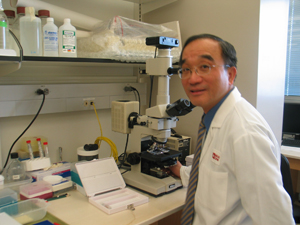 UNMC researcher Ming-Fong Lin, Ph.D., answers questions about his work, life and interests.
UNMC researcher Ming-Fong Lin, Ph.D., answers questions about his work, life and interests.
NOTE: This profile is part of a series highlighting the 25 researchers who were named UNMC Distinguished Scientists for 2006. Each of these researchers will be profiled in UNMC Today leading up to a March 12 ceremony to recognize their achievements.
- Name: Ming-Fong Lin, Ph.D.
- Title: Professor of biochemistry, molecular biology and surgery
- Joined UNMC: 1995
- Hometown: Taipei, Taiwan
Describe your research in 25 words or less.
My research is focused on investigating the molecular mechanism behind prostate cancer and its progression. Our ultimate goal is to develop strategies for preventing prostate cancer.
How did you decide to pursue this area of research?
When I was a Ph.D., student, my adviser at UW-Madison succumbed to prostate cancer. I was devastated and ended up transferring to Roswell Park Memorial/Cancer Institute in order to finish my degree. While at Roswell Park, my new adviser discovered prostate-specific antigen (PSA), the most effective prostate cancer marker to this day. My early encounter with cancer has made me realize the gravity of cancer research and I unyieldingly pursue it.
When did you realize you were interested in research?
When I was an undergraduate sophomore, I spent the summer in my father’s lab, where I stumbled upon my interest in research. Since that time forward, I have dedicated my life to this passion.
What are the greatest challenges in research today?
Technological developments are rapidly advancing today. One of the major challenges is realizing how to utilize this technology to gain its fullest benefits, but also recognizing its weaknesses.
Best advice for new researchers?
As my post-doctoral mentor told me, “Be persistent and self-motivated.”
When an experiment stalls, what drives you to continue on?
Experiments stall-this is one of the facts of life. However, realizing that stalled experiments are a component of the discovery process keeps me motivated and focused.
Who has been your greatest teacher?
My greatest mentor was my father, a veterinary doctor, and my late father-in-law, a medical doctor. I admired their attitudes toward research. Both of them gave up their private practices and devoted their careers to research. They made significant contributions to their respective fields in science and served people.
Tell us about your family and hobbies outside the lab.
I am extremely fortunate to have my family. They have always supported me with my decisions. As far as hobbies go, I enjoy watching movies, listening to music and traveling.
Globally, describe the most notable research achievement ever?
In the field of prostate cancer research, the discovery of PSA (prostate specific antigen) is a major milestone/achievement. This marker has saved thousands of lives.
Clarify a common misconception about research?
There’s a tendency for people to think that living a life dedicated to research is strenuous. But like all careers, it has its ups and downs. The key is to focus on the ups.
What would you tell a student interested in a research career?
I would say, look up and not around. You should enjoy what you are doing and be proud of it.
List three things few people know about you.
- I enjoy cooking;
- I was a boxer; and
- I won many championships.